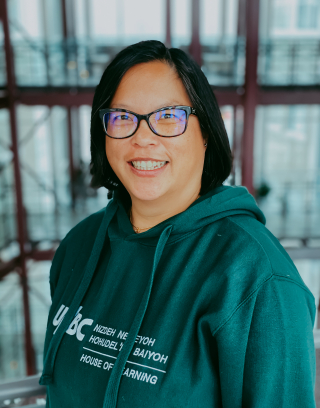
The First Peoples Principles of Learning
- Learning ultimately supports the well-being of the self, the family, the community, the land, the spirits, and the ancestors.
- Learning is holistic, reflexive, reflective, experiential, and relational (focused on connectedness, on reciprocal relationships, and a sense of place).
- Learning involves recognizing the consequences of one‘s actions.
- Learning involves generational roles and responsibilities.
- Learning recognizes the role of Indigenous knowledge.
- Learning is embedded in memory, history, and story.
- Learning involves patience and time.
- Learning requires exploration of one‘s identity.
- Learning involves recognizing that some knowledge is sacred and only shared with permission and/or in certain situations.
Sourced: http://www.fnesc.ca/first-peoples-principles-of-learning/

I have renewed my commitment to the First Peoples Principles of Learning as a non-Indigenous person and educator. The First People Principles of Learning were first introduced in 2006/2007 with English First Peoples 12. This articulation of the First Peoples of Learning was then adopted for the entire BC Curriculum in 2016. The First Peoples Principles of Learning work side-by-side with BC’s Curriculum. It is a way of being and complementary to the Core Competencies.
In 2022/2023, I wanted to embedded the First Peoples Principle of Learning explicitly and implicitly in the classes I taught in Teacher Education and Graduate Studies. I begin each class acknowledging the territory and I brought my classes outside to learn about experiential learning, land based learning, and different pedagogies that does not involve “the classroom.” We celebrated the National Day of Truth and Reconciliation on campus at the Ceremonial Fire Circle, UHNBC Drummers, and Dr. Daniel Sims. We also went to Two Rivers Art Gallery, Prince George Public Library, and SD57 District Learning Centre to learn “in place.”

We also went to Westlake Provincial Park, Cottonwood Park, Nechako Riverside Park, and Lheidli T’enneh Memorial Park to learn outside and discover land as teacher. We were building our relationship with the land and water while we were also learning how to co-construct lesson plans, collectively sense-make BC’s Curriculum, reflect on local Indigenous history, and engage in Imaginative Ecological Education and cognitive tools using the Walking Curriculum. We did our best to #getoutside when we could. As you can see, the weather gets cold.
In previous years, my class learned about BC’s Curriculum from Jo Chrona’s blog: https://firstpeoplesprinciplesoflearning.wordpress.com/ We walked on the trails in the Forests of the World and visited the pit house built by community and students in another course held at the university. We sense-make in small groups and we connect and collaborate our understandings in circle. There are only a few examples of how I embed the First Peoples Principles of Learning in my practice but I am also aware that local Indigenous communities in partnership with school districts are developing an articulation of local ways of being. For example, in SD57, the community developed the Dakelh Holistic Lifelong Learning Model.

I had the great fortune over a decade had the opportunity to work with amazing BC educators with Canadian Indigenous heritage, such as Anne Tenning and Desiree Marshall-Peer as seen in the photo above, to help me to develop and deepen my understandings of the First Peoples Principles of Learning. I am also grateful to Jo Chrona, Karla Gamble, Brad Baker, Cecelia Reekie, Noelle Pepin, Daniel Sims, Jessie King, Darlene McIntosh, Clayton Gauthier, and the UHNBC Drummers. You’ve all played an integral role to my learning and understanding.
There are so many other people who help me to see my colonial ways of being, my biases, and my privilege. I learn from elders, beaders, students, and community. I will continue to learn and acknowledge local Indigenous culture and knowledge. Humility and humanity are at the heart of this work. As a second-generation Chinese Canadian woman, born and raised in Prince Rupert, BC., I am humbled and honoured to be living and learning on the unceded ancestral territory of the Lheidli T’enneh. I am a settler on this stolen land. Thank you for having me.




